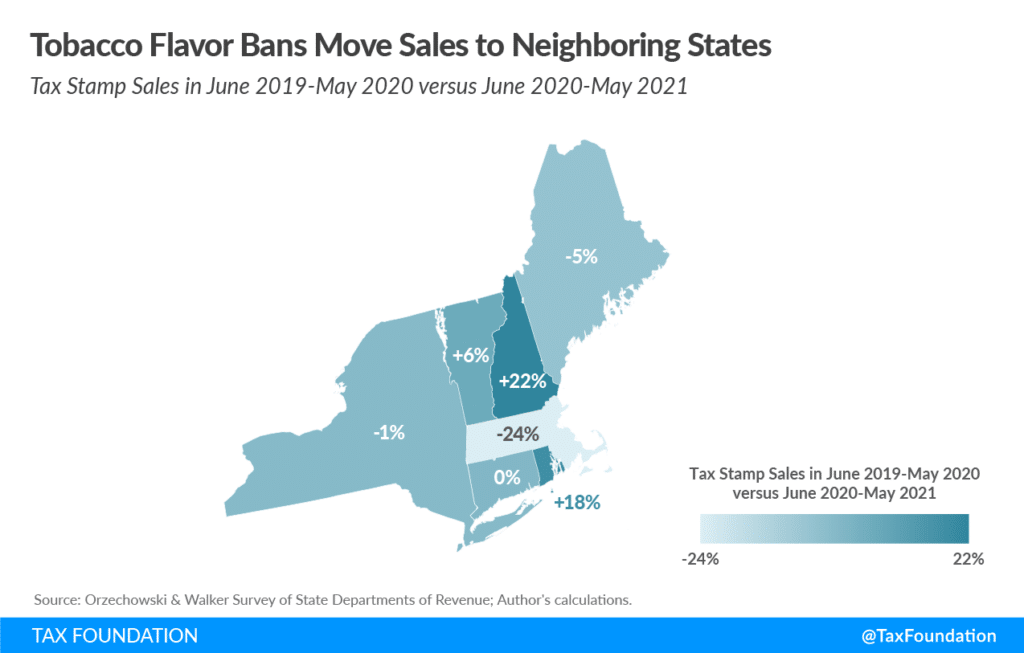A version of this testimony was submitted to the Rhode Island House Committee on Health and Human Services on April 5, 2022.
Thank you for allowing me the opportunity to submit testimony on House Bill 7870.
My name is Guy Bentley, and I am the director of consumer freedom at the Reason Foundation, a 501(c)3 nonprofit think tank. The consumer freedom project analyzes and promotes policy solutions that improve public health while avoiding unintended consequences and protecting consumer choice.
The intention behind this bill to limit tobacco use, especially among youth, is to be applauded. However, the evidence of the success of such prohibitions should raise significant concerns that the ban would promote further inequalities in the criminal justice system, push sales and tax revenue to other states, increase the illicit tobacco trade, and fail to improve public health in Rhode Island.
Case Studies: Massachusetts, Canadian Provinces, and the European Union
Massachusetts’ ban on flavored tobacco products went into effect in June of 2020. The Reason Foundation has conducted a yet-to-be-published, preliminary analysis of the ban’s impact which compared cigarette sales in and around Massachusetts the year prior to the ban and the year following the ban’s implementation. We found that there was a net increase in cigarette sales of 7.2 million packs sold within Massachusetts and in its bordering states.
These figures likely underestimate cross-border trade because they do not also account for lost sales of flavored e-cigarettes, smokeless tobacco, or cigars. Massachusetts also saw a 15.6 million pack increase in non-menthol cigarette sales as consumers switched brands.
According to the Tax Foundation, Massachusetts lost $125 million in tobacco revenue for the fiscal year 2021.

Furthermore, according to a study published by the Journal of Law and Economics, Canadian provinces’ menthol prohibition significantly increased non-menthol cigarette smoking among young people, resulting in no overall net change in youth smoking. As for adult smokers, provincial menthol bans simply shifted smokers’ cigarette purchases away from grocery stores and gas stations.
The world’s largest experiment in menthol prohibition is the European Union, which includes 27 countries and has a population of 447 million people. The EU ban became effective in May of 2020. Prior to the ban, Poland had the largest menthol cigarette market in the EU, making up 28 percent of total sales. An analysis funded by the Norwegian Cancer Society in partnership with the Polish Ministry of Health found there was no statistically significant decline in cigarette sales after the ban.
These results are important not just because they demonstrate an immediate economic impact on jurisdictions that introduce prohibition but, thanks to cross-border trade and the substitution of non-menthol cigarettes, any predicted public health benefits are likely to be severely limited. In other words, the loss in tax revenue is unlikely to be offset by lower health care costs or improved public health.
Public Health and Disparate Impacts
Advocates for the prohibition of menthol cigarettes correctly observe that a disproportionate number of black smokers choose menthol products. In Rhode Island, some hope the ban would dramatically reduce the state’s smoking rate. While these populations are more likely to use a menthol product while white smokers are more likely to use a non-menthol product, smoking prevalence is, in fact, lower among black youth and adults.
Black non-Hispanic young people are less likely to smoke than their white peers. In Rhode Island, 4.1 percent of white high schoolers smoked in 2019. For black Rhode Island high schoolers, the number was 3.4 percent. These data conform to Reason Foundation’s study published in 2020 showing that states with higher menthol cigarette use tend to have lower, not higher, youth smoking rates.
From a public health standpoint, as black adults and young people smoke at lower rates than non-Hispanic whites, it’s hard to ascertain why non-menthol cigarettes, which are equally dangerous, would not be subjected to prohibition while menthol products would be.
Because menthol cigarettes are overwhelmingly the choice of minority smokers, prohibition will necessarily lead to a concentration of the illicit tobacco market in minority communities. The American Civil Liberties Union and other civil rights groups warn that the prohibition of menthols could disproportionately negatively impact people of color, trigger criminal penalties, and prioritize criminalization over public health and harm reduction. The National Organization of Black Law Enforcement Executives (NOBLE), Grand Council of Guardians (GCGNY), National Association of Black Law Enforcement Officers (NABLEO), and Law Enforcement Action Partnership (LEAP) have argued that prohibitions of all kinds disproportionately affect communities of color, and this is especially the case when it comes to banning menthol cigarettes.
Food and Drug Administration Review and Tobacco Harm Reduction
Last year, the Food and Drug Administration authorized an e-cigarette as “appropriate for the protection of public health” for the first time. The FDA is also currently reviewing e-cigarette product applications that contain reams of data on safety, efficacy, and potential threats to youth. If the FDA finds that any product is a net harm to public health, it will be removed from the market. But if the product is deemed to be net beneficial, it will be authorized for sale as appropriate for the protection of public health.
If Rhode Island chooses to ban these products prior to the FDA concluding its review, it would limit consumer access to products the FDA may deem as a positive for public health. According to a survey conducted by the International Tobacco Control Policy Evaluation Project, 57 percent of vapers said they would continue vaping if flavors were banned and half said they would find a way to get their preferred flavor. Of most concern was the finding that close to one in five vapers said they would stop vaping and smoke instead.
While prohibiting e-cigarette flavors other than tobacco may seem an attractive solution to the problem of youth vaping, policymakers should recognize that, according to the 2021 National Youth Tobacco Survey (NYTS), 89 percent of high schoolers are not using e-cigarettes at all and 95 percent are not using them frequently. Youth vaping has also fallen to its lowest point in seven years.
Furthermore, data released by the Centers for Disease Control and Prevention (CDC) shows flavors are not the leading reason why youth initiate vaping. According to the CDC, the primary reason youth initiate vaping is curiosity, followed by use by a friend or family member. Availability in flavors, such as mint, candy, fruit, or chocolate comes as a very distant third. Banning flavored tobacco products may also induce perverse outcomes contrary to the promotion of public health among adolescents.
In 2018, San Francisco banned the sale of all flavored tobacco products, including e-cigarettes with flavors other than tobacco. Yale University’s Abigail Friedman found that after the ban was enacted, San Francisco area youth had double the odds of smoking compared to similar jurisdictions with no tobacco flavor ban.
“While neither smoking cigarettes nor vaping nicotine are safe per se, the bulk of current evidence indicates substantially greater harms from smoking, which is responsible for nearly one in five adult deaths annually. Even if it is well-intentioned, a law that increases youth smoking could pose a threat to public health,” said Friedman.
According to a 2020 study by researchers at Yale School of Public Health, the use of e-cigarette flavors is positively associated with smoking cessation outcomes for adults but not associated with increased youth smoking. The prestigious Cochrane Review concluded e-cigarettes are more effective than traditional nicotine replacement therapies for helping smokers quit.
Prohibition of flavored e-cigarettes, which are overwhelmingly the choice of adult vapers, risks driving vapers back to smoking, fueling illicit markets, and forcing the closure of Rhode Island vape shops.

